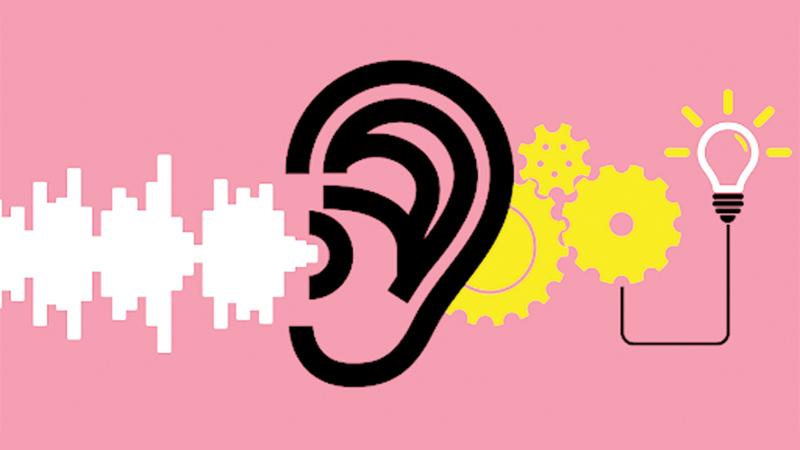
 There are many seminars, workshops and training programs on communication skills, presentation skills, and writing skills. I am yet to come across a session on listening. Why? The reason is simple. We take it for granted. For me it is the neglected component of communication. Today’s column will discuss the listening in detail with specific lessons for Sri Lankans.
There are many seminars, workshops and training programs on communication skills, presentation skills, and writing skills. I am yet to come across a session on listening. Why? The reason is simple. We take it for granted. For me it is the neglected component of communication. Today’s column will discuss the listening in detail with specific lessons for Sri Lankans.
Listening vs hearing
Psychologists say, we are born to hear but we have to learn to listen. Hearing is passive and listening is active. Let’s say I am walking along a road hearing various sounds. All of a sudden, I hear my favourite song being aired on an FM channel. I turn and listen to it with enthusiasm. A passive activity has now become a focused activity. That is the way to listen.
They say man is an intelligent creation. Imagine the state if man had two mouths and only one ear. The message is simple. We are supposed to listen more than we talk. Are we really doing so? I doubt it. Either we keep on talking or impatiently wait for others to finish, to resume our talking. We are surely a nation of talkers but not necessarily a nation of listeners and perhaps, not a nation of consistent achievers.
Process of listening
Listening needs proper “wiring” between the two ears and the brain. The first step is sensing and selecting. We chose a sound we heard to listen to. Then comes the interpreting. We attach a meaning to what we heard. For example, the screaming of your son might be more important to you than the scolding of your mother-in-law. We evaluate the assigned meaning in our head.
Do I need to respond? What should I do? Then comes the appropriate response. Finally, the whole episode of listening will be a part of your memory. In summary, it goes through the steps of sensing, interpreting, evaluating, responding, and memorising.
How good are we at engaging in this process? There are a variety of stories in folklore where improper listening has led to chaos. If the process of listening does not take place properly, we might be ill-informed, misunderstood or confused. That highlights the listening as leverage for individual and institutional success.
If a leader does what he/she wants without listening to his/her teammates, the result might have dire consequences. If the team does not listen to the leader and resorts to doing what each of them wants, there will be total chaos.
It is true for a couple, a family, a school, a company and even a country. The key point here is that listening is important with your team at work as well as with your team at home.
Levels of listening
Are we listening the same way and with the same focus all the time? The answer is obviously no. They are several levels of listening as highlighted by many behavioural scientists and management writers. I prefer to go with Stephen Covey who proposed five key levels. Let’s discuss them with suitable examples.
Level 1: Ignoring
Imagine you have come back home after a heavy day at the office and leaning back to a cozy armchair and reading the daily paper. Your spouse comes and starts sharing his/her daily proceedings. You might tend to display this level of listening, which is the worst form of listening.
It clearly gives the impression to the speaker that you are simply not interested in listening. That message is rather crude as you do not even make any attempt to listen properly. It can happen with an arrogant boss or with an irresponsible worker. This level is not very uncommon to Sri Lankans.
Level 2: Pretended listening
This is no better than ignoring but there is a false sense of assurance to the speaker that you are listening. I have seen this happening in many lectures and training programs. The participants are bodily present there but mentally and emotionally elsewhere. It is obvious that they themselves are the losers. Eventually you will get caught as you will not know the substance.
We have many Sri Lankan examples for this level. Perhaps the most common one could be the “magnanimous” behaviour of so-called pro-people politicians. Poor and needy get a comforting assurance which is short lived with broken promises most of the time. I have seen in business organisations, how senior managers practice it almost daily. They are preoccupied with business issues, or what is going to happen at the next meeting, but by firmly telling the speaker to continue assuring that he/she is listening with enthusiasm.
Level 3: Selective listening
This can be rather funny at times. You pick and choose what to listen and what not to listen. Let’s go back to the domestic front. The evening setting where you are glancing through the daily newspaper while your spouse is sharing the daily proceedings. If the topics are electricity bills, telephone bills or water bills you tend to cut off. If the topic is your pretty and naughty next-door neighbour, you listen with eagerness.
The main issue at this level is that you get a distorted message. Selecting keywords or phrases will not convey the complete message. Getting the wrong message would lead to dire consequences. Trade unions might capitalise on one part of a managing director’s statement and go on agitating. Sales people might get only a part of a customer complaint and react improperly. There are many more such instances with inevitable communication breakdowns.
Level 4: Attentive listening
This is surely the best level so far. You listen with attention. In a face-to-face conversation, they refer to it as “whole body listening.” You pay adequate attention to what the speaker says with proper eye contact and matching body gestures. In brief, you give the assurance to the speaker that you are listening with needed focus. By affirming from time to time, you ensure that you got the message accurately.
A medical practitioner has to do that all the time.
It can be a matter of life and death. Without attentive listening, employees at all levels cannot be efficient and effective. However, much we accept and admit it as the preferred level of listening, we tend to deviate from it often. It could be due to a variety of barriers, both physical as well as mental.
My experience is that physical barriers are easier to remove than mental barriers. If there is a disturbing noise that prevents you from attentive listening, either you put more focus, or try to remove the disturbance, or at least to minimise the impact of the disturbance.
On the other hand, wrong perceptions of the speaker, negative past experiences involving the speaker or disturbing thoughts about the speaker, might be considered as mental barriers. Some have confessed to me that they find it difficult to be attentive when a stunning beauty speaks to them, as the attention goes not to her voice, but elsewhere. The key challenge in dealing with both the team at work and team at home is to overcome such physical and mental barriers in consistently maintaining attentive listening. We Sri Lankans have a long way to go, despite our upbringing associated with mindfulness.
Level 5: Empathic listening
The above four levels we discussed have one thing in common. As Stephen Covey puts it, looking from “one’s frame of mind.” In other words, I am approaching the process of listening from my point of view. The fifth level takes us to a different dimension. That is, demonstrating empathy while listening. In other words, listening with “other’s frame of mind.”
The key word here is empathy. Empathy is different from sympathy. Sympathy is being sorry and sad towards someone. Empathy is the capacity to understand the other person. It is a matter of getting into “other’s shoes” and seeing the world from the other’s point of view. Many disputes ranging from individual clashes to industrial disputes can be a result of not having empathy. There are two sides to a coin, and one should avoid one-sided decisions.
Connecting empathy and listening results in listening with care. When you engage in empathic listening, you seek to understand the speaker’s message in the broad context of his/her experience. Take an example of you as a manager scolding a factory worker coming late to work.
That worker might be a mother of two, getting up early in the morning to cook, to wash the ailing mother, and prepare the children to send to schools and to take a cup of tea to the husband who is still asleep. Empathy does not mean being lenient, but to be better at knowing the other side of the story.
One may ask whether we can be emphatic listeners all the time. The simple answer is no.
It specifically refers to dealing with human issues in practices such as grievance handling, performance coaching and counseling. My preference is to consistently practice attentive listening and switch over to empathic listening where necessary. Other three levels are much worth avoiding.
Way forward
Listening is critical for leadership. This is applicable to people and nations. Leaders have to become better listeners to ensure that the right decisions leading to right actions are taken without delay.
At a time when the whole country is going through a turbulence, this aspect has become important as never before.
